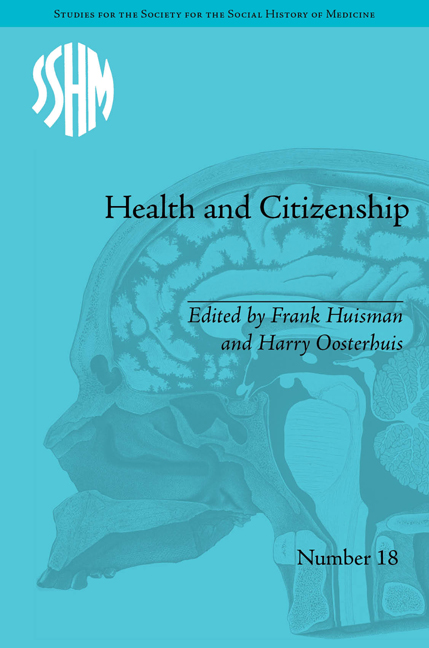Book contents
- Frontmatter
- CONTENTS
- Acknowledgements
- List of Contributors
- The Politics of Health and Citizenship: Historical and Contemporary Perspectives
- Part I Liberal Citizenship and Public Health
- 1 Before l'État-Providence: Health and Liberal Citizenship in Revolutionary and Post-Revolutionary France
- 2 An Oyster Odyssey: Science, State and Commerce in England, 1895–1905
- 3 Monopoly or Freedom of Healing? The Role of Medicine in a Modernizing Society
- 4 Ambivalences of Liberal Health Policy: Lebensreform and Self-Help Medicine in Belgium, 1890–1914
- Part II Social Citizenship: Health in the Welfare State
- Part III Neo-Republican Citizenship: Health in the Risk Society
- Notes
- Index
3 - Monopoly or Freedom of Healing? The Role of Medicine in a Modernizing Society
from Part I - Liberal Citizenship and Public Health
- Frontmatter
- CONTENTS
- Acknowledgements
- List of Contributors
- The Politics of Health and Citizenship: Historical and Contemporary Perspectives
- Part I Liberal Citizenship and Public Health
- 1 Before l'État-Providence: Health and Liberal Citizenship in Revolutionary and Post-Revolutionary France
- 2 An Oyster Odyssey: Science, State and Commerce in England, 1895–1905
- 3 Monopoly or Freedom of Healing? The Role of Medicine in a Modernizing Society
- 4 Ambivalences of Liberal Health Policy: Lebensreform and Self-Help Medicine in Belgium, 1890–1914
- Part II Social Citizenship: Health in the Welfare State
- Part III Neo-Republican Citizenship: Health in the Risk Society
- Notes
- Index
Summary
In 1913, three Dutch lawyers presented a petition to the Dutch parliament. In their request, they argued for the abolition of the monopoly of treatment by physicians, as was formally provided for in legislation dating from 1865. The lawyers disputed the physicians' exclusive right to perform medical interventions because they had serious doubts about their therapeutic competence. And because the lawyers questioned the state's right to intervene in the health maters of individual citizens, they felt that the state should stop favouring academic physicians above other kinds of healers. They argued that medicine should serve the patient rather than the physician, and that the state should be impartial. The petition caused much political and social commotion. As many as 7,700 people expressed their approval of its contents by signing the petition, while the Dutch government was prompted to ask the Central Health Council (the highest advisory body in the field of health care) and two State Committees for formal advice on the issue. During the five years in which the petition was under discussion many articles, brochures and pamphlets were written, both in favour and opposing it. At stake was no less than the cultural authority of medicine.
The controversy on the petition took place in the 1910s, or – in terms of the periodization suggested in the introduction to this volume – in the transitional era between liberal and social citizenship.
- Type
- Chapter
- Information
- Health and CitizenshipPolitical Cultures of Health in Modern Europe, pp. 85 - 100Publisher: Pickering & ChattoFirst published in: 2014

